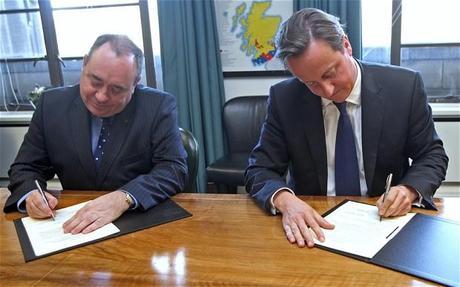
So I have done a post on Scottish Independence before on my old blog, but in my public law and human rights lecture on Friday, we had two guest speakers in giving us a talk on their views on Scottish Independence. This raised the issue again in my mind, and so I thought I'd post an updated, more factual blog on the reasons for and against Scottish Independence! When David Cameron and Alex Salmond met in Edinburgh in 2012, they set out terms for a vote which will define Scotland's future. The Prime Minister and Scottish First Minister agreed on a one-question, yes or no referendum on Scottish independence, with voting taking place in autumn of 2014. Mr Cameron insists Britain is 'better together' while Mr Salmond urged Scots to vote 'yes' to independence. In this blog post, I will be giving YOU unbiased arguments both for and against Scottish Independence to help you (if you're living in Scotland or Scottish) to decide what you will vote, and if you're living in the rest of the United Kingdom to help you understand both sides and decide what you think is best!
Why would Scottish Independence be a good thing? - As Scotland’s First Minister Alex Salmond puts it, the referendum will give Scots a once-in-a-lifetime choice between ‘freedom and stagnation’. Supporters of independence argue that Parliament will take away bus passes, personal care and free prescriptions which were ‘big achievements’ of the Scottish Parliament.- SNP supporters believe the UK’s economic growth is centred around London and the South East and they also believe that this would change if Scotland was completely in charge of its own affairs. They also believe separation from the UK would allow the country to further its European interests, such as farming, fisheries and oil. Independence would allow Scotland to directly benefit from its North Sea oil reserves which are estimated to be at 20 billion barrels of recoverable oil and gas reserves beneath the UK part of the North Sea. - It is sometimes argued that the UK parliament fails to recognize Scotland’s unique needs, values and aspirations; Scotland’s interests are always secondary to England’s. The UK is run by parties which were initially rejected by the citizens of Scotland. - In addition it is arguable that Scotland needs to take responsibility for the taxes it spends, and mold its policies to its needs and raise the taxes to match its spending, instead of using the UK’s taxes to pay for its excessive expenditures. There is absolutely no reason why Scotland cannot control its own destiny, and become have equal powers to England, and take its full place in the world.
Is Scottish Independence really the right way to go? - At the moment, the economist says that we’re in a ‘stormy economic world’ and that independent Scotland would be a small, vulnerable barque as it would depend on oil for 18% of its GDP, making it subject to shifts in global commodity prices. It also tells us that the North Sea production has been falling by about 6% a year for the past decade, and eventually the oil will completely run out. - Many Scottish citizens are still unconvinced by the notion of being an independent state, due to arguments proposed by David Cameron who said that it would inherit the ‘burdens and risks’ that come with being independent, while also losing ‘the benefits and opportunities we have as part of the UK’. Experts have also argued that the uncertainty towards independence is highly unlikely to change in just over a year in time for the 2014 referendum remaining between 25 and 35 per cent.- In addition to this, Salmond has secured the voting power of 16 and 17 year old Scots in the referendum because he assumed that younger people are more nationalistic, however, this is considered a ‘misconception’ and that it won’t be of ‘decisive importance’. Young people are not known as being the most eager when it comes to using their vote, and there is a misconception thinking that ‘young ones will be more gung-ho for independence.’ A recent survey said that only 25 per cent of young people supported independence. - The Union has served both countries well for the last 300 years, it is how everyone knows it. Devolution is a young experiment, and it is far too soon to judge what it could lead to. - There is a gap between public spending in Scotland is around 40 billion pounds, and its revenue, raised in Scotland is around 27 billion. A Scottish government would have to choose between higher taxes or cuts in public spending – things in which the Scottish Nationalist Party are inherently against. - The integrated British economy is more capable than an independent Scotland would be of meeting the challenges of globalisation. Likewise, having independent defence and security structures would overstrain Scotland’s resources. - In addition to this, Scottish citizens should recognize that devolution has put England at a disadvantage, and should press for reforms to the way Westminster works in order to make it work better for everyone. Satisfying English grievances would put the marriage back on an even keel, it is suggested that this devolution is unnecessary and would be painful for all parts of the UK. - Giving Scotland control over taxation and welfare would heavily impact all parts of the UK and require reform of the UK parliament and undermine the unity. - Scotland would face greater financial risks and lose the security of the UK, it will also gain little further devolution. It would rely on a foreign bank and be in damaging competition with its closest, larger neighbor.
So there are a few arguments for and against Scottish Independence, hopefully this will help you to understand the reasons for the debate on Scottish Independence and help you to make a decision on what you think independence would bring to the UK!
Muchos love Ysabelle
